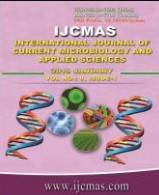


 National Academy of Agricultural Sciences (NAAS)
National Academy of Agricultural Sciences (NAAS)

|
PRINT ISSN : 2319-7692
Online ISSN : 2319-7706 Issues : 12 per year Publisher : Excellent Publishers Email : editorijcmas@gmail.com / submit@ijcmas.com Editor-in-chief: Dr.M.Prakash Index Copernicus ICV 2018: 95.39 NAAS RATING 2020: 5.38 |
The quantum of import and export of plant commodities have been increased during the recent years, there is a distinct possibility of moving insect pests and diseases from their original native habitation to new location. The government of India in 2003 has notification of a new plant Quarantine Order (PQ Order) to harmonized India’s regulatory frame work with the International Plant protection Convention (IPPC) and internationally accepted standard and the tenets of the SPS agreement of the World Trade Organization (WTO).Globally, direct yield losses caused by insect-pest and pathogens are altogether responsible for losses ranging between 20 and 40 % of agricultural productivity. There are some important international and national level quarantine diseases which cause extensive damage (about 15-25 %) to our country. So to prevent the introduction of exotic pests, diseases and weeds from foreign countries or within country, there are international agencies like IPPC, and national agencies like NPPO (Directorate of Plant Protection, Quarantine and Storage) which are involved in plant quarantine program. In plant quarantine program, Phytosanitay measures acts as an important tool in excluding pests from the crop. Under Phytosanitary measures, there is requirements needed for exporting as well as importing countries. For exporting countries, Phytosanitary certificate is required for inspection and identification of pest and a requirement for treatment at origin; if required. For importing countries, Acceptance of certification or safeguarding program (involve inspection upon arrival at port of entry or treatment if necessary; isolation, special testing or additional quarantine after entry) at origin. Phytosanitary process for exporting countries involves declaration, document checking, commodities inspection and phytosanitary keeping records whereas phytosanitary process for importing countries involves declaration, checking, inspection of seed plants or benefit organism, regulation of phytosanitary notification, samples and phytosanitary record keeping. More recently, international treaties, like the SPS Agreement and the IPPC have been adopted to provide a framework for how countries should implement national laws and regulations related to managing the risks associated with foreign pests. Thus, phytosanitary measures have become the basis for national laws and regulations aimed at preventing the introduction and spread of new pests. As these quarantine pest causing huge losses to horticultural as well as agricultural commodities, so through the involvement of international and national agencies and by phytosanitary measures, contaminated consignment can be reduce by 40per cent.
 |
 |
 |
 |
 |